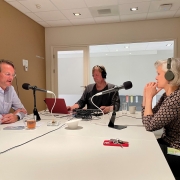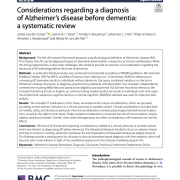Interest in genetic susceptibility testing and disclosure of AD dementia risk in cognitively normal adults: a survey study
Lisa Waterink, Larissa A. Masselink, Sven J. van der Lee, Leonie N. C. Visser, Solange Cleutjens, Jetske van der Schaar, Argonde C. van Harten, Philip Scheltens, Sietske A. M. Sikkes, Wiesje M. van der Flier and Marissa D. Zwan
Abstract
Background
Apolipoprotein-E (APOE) genetic testing for Alzheimer’s disease is becoming more important as clini- cal trials are increasingly targeting individuals carrying APOE-ε4 alleles. Little is known about the interest in finding out one’s genetic risk for Alzheimer’s disease in the general population. Our objective was to examine this in a sam- ple of cognitively normal (CN) adults within a population-based online research registry with the goal to implement APOE-ε4 status for trial recruitment.
Methods
An online survey was completed by 442 CN participants between the age of 49 and 75 years (56% female) from the Dutch Brain Research Registry. The survey assessed interest in participation in research into, and disclosure of, genetic risk for dementia. The survey assessed interest in participation in research into, and disclosure of, genetic risk for dementia and knowing their genetic risk in different hypothetical risk scenarios (10%, 30%, and 50% genetic risk for dementia at age 85, corresponding to APOEε2/ε2 or ε2/ε3, APOEε3/ε4 or ε2ε4, and APOE-ε4/ε4 genotypes). Cochran’s Q and post hoc McNemar tests were used to analyse differences in frequencies across scenarios.
Results
Most participants were interested in participating in research into and disclosure of their genetic risk (81%). The most reported reason was to contribute to scientific research (94%). Interest was higher in males, whilst lower- educated participants were more often undecided. When provided with different risk scenarios, interest in knowing their risk was somewhat higher in the scenarios with higher risk, i.e. in the 50% (79%) compared to the 10% scenario (73%;χ2(2) = 7.98; p = .005). Most individuals expected they would share their genetic risk with close relatives (77–89%), would participate in medication trials (79–88%), and would make long-term arrangements, e.g. retirement, health care, will (69–82%), with larger proportions for scenarios with higher hypothetical genetic risk.
Conclusions
Our findings indicate that the vast majority of CN adults participating in a research registry expresses interest in AD genetic risk research and disclosure. Interest in genetic risk disclosure is higher in scenarios correspond- ing to the APOE-ε4 genotype. This suggests APOE-ε4 screening within an online research registry is potentially a well- received method to accelerate inclusion for trials.











